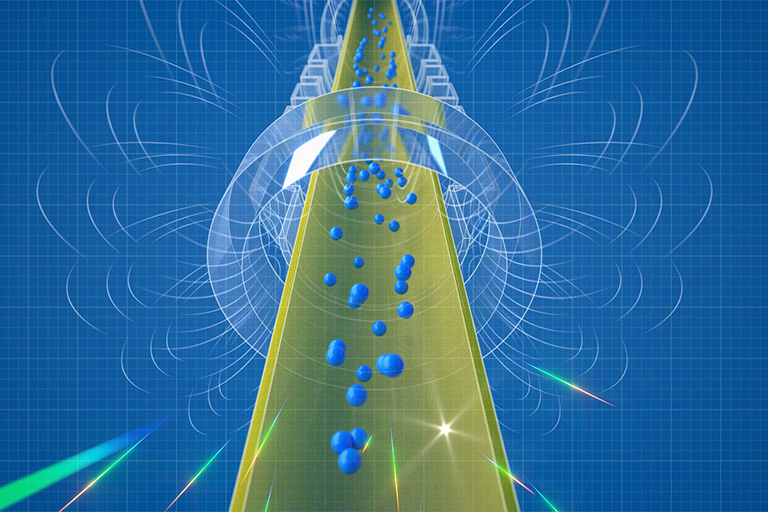
Antihydrogen atoms (blue) fall inside a magnetic trap and annihilate in an experiment to measure the effects of gravity on antimatter. Image: U.S. National Science Foundation
For those still holding out hope that antimatter levitates rather than falls in a gravitational field, like normal matter, the results of a new experiment are a dose of cold reality.
Physicists studying antihydrogen — an antiproton paired with an antielectron, or positron — have conclusively shown that gravity pulls it downward and does not push it upward.
At least for antimatter, antigravity doesn't exist.
The experimental results will be reported in the Sept. 28 issue of the journal Nature by a team representing the Antihydrogen Laser Physics Apparatus (ALPHA) collaboration at the European Center for Nuclear Research (CERN) in Geneva, Switzerland. The gravitational acceleration of antimatter that the team comes up with is close to that for normal matter on Earth: 1 g, or 9.8 meters per second per second (32 feet per second per second). More precisely, it was found to be within about 25% (one standard deviation) of normal gravity.
"It surely accelerates downwards, and it's within about one standard deviation of accelerating at the normal rate," said Joel Fajans, a UC Berkeley professor of physics who, with colleague Jonathan Wurtele, a theoretician, first proposed the experiment more than a decade ago. "The bottom line is that there's no free lunch, and we're not going to be able to levitate using antimatter."
The result will not surprise most physicists. Albert Einstein's theory of general relativity, though conceived before antimatter was discovered in 1932, treats all matter identically, implying that antimatter and matter respond the same to gravitational forces. All normal matter, such as protons, neutrons and electrons, have anti-particles that bear the opposite electrical charge and, when they encounter their normal matter counterpart, annihilate completely.
"The opposite result would have had big implications; it would be inconsistent with the weak equivalence principle of Einstein's general theory of relativity," said Wurtele, UC Berkeley professor of physics. "This experiment is the first time that a direct measurement of the force of gravity on neutral antimatter has been made. It's another step in developing the field of neutral antimatter science."
